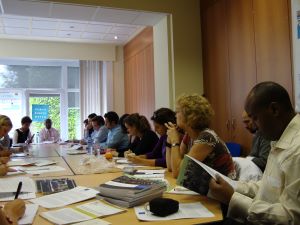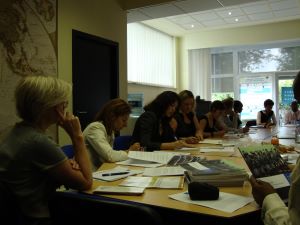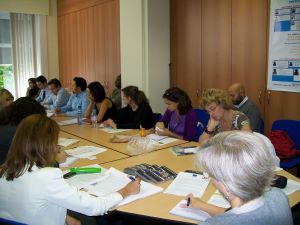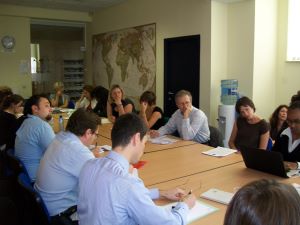Report of the Roundtable on Human Rights in Eritrea
 On 10 September 2009, the East and Horn of Africa Human Rights Defenders Project (EHAHRDP), Human Rights Concern - Eritrea (HRC-Eritrea), and Human Rights Watch (HRW) jointly hosted a roundtable on the human rights crisis in Eritrea. The roundtable took place at the offices of HRW in Brussels. The event was organised in commemoration of the widespread clampdown on democratic reform in Eritrea which manifested in the form of arbitrary arrests and other draconian measures taken by the Eritrean government on 18 September 2001.
On 10 September 2009, the East and Horn of Africa Human Rights Defenders Project (EHAHRDP), Human Rights Concern - Eritrea (HRC-Eritrea), and Human Rights Watch (HRW) jointly hosted a roundtable on the human rights crisis in Eritrea. The roundtable took place at the offices of HRW in Brussels. The event was organised in commemoration of the widespread clampdown on democratic reform in Eritrea which manifested in the form of arbitrary arrests and other draconian measures taken by the Eritrean government on 18 September 2001. Although Eritrea has never seen democratic governance since its independence in 1991, the political crisis exacerbated mainly after 2001 by which the true colours of the Eritrean government were revealed beyond doubt. As noted several times by independent observers and writers, since 2001 the country has become a centre of attraction “for all the wrong reasons” and has rapidly descended into “political turmoil, economic decline and social repression.”
 The roundtable offered an overview of the human rights situation in Eritrea, with a focus on the situation of human rights defenders and the risks facing Eritrean asylum seekers that are returned to their country from different countries, including European countries. Panellists were Elisabeth Chyrum, Executive Director of HRC-Eritrea; Hassan Shire Sheikh, Executive Director of EHAHRDP and Leslie Lefkow, Researcher on the Horn of Africa at HRW.
The roundtable offered an overview of the human rights situation in Eritrea, with a focus on the situation of human rights defenders and the risks facing Eritrean asylum seekers that are returned to their country from different countries, including European countries. Panellists were Elisabeth Chyrum, Executive Director of HRC-Eritrea; Hassan Shire Sheikh, Executive Director of EHAHRDP and Leslie Lefkow, Researcher on the Horn of Africa at HRW.
The roundtable was attended by a number of NGO leaders, human rights defenders and European Commission staff in Brussels. Some of the participants included preventatives from the following organisations: Reporters Without Boarders, International Federation of Journalists, Christian Solidarity Worldwide, Front Line Protection of Human Rights Defenders, Human Rights Without Frontiers, International Partners for Human Rights, Europe External Policy Advisors, Eritrean Movement for Democracy and Human Rights and others.
 Panellists highlighted that the human rights situation in Eritrea is dire: freedom of speech and press are inexistent; freedom of association regularly and violently clampdown on and freedoms of movement, religion and opinion harshly restricted. Given this sad reality the role of the international community and particularly the European Union (EU), as one of the top donors to Eritrea, in trying to improve the human rights crisis has been very little. During the comments and questions session, one of the most debated issues was the role of the EU in improving the human rights situation in Eritrea.
Panellists highlighted that the human rights situation in Eritrea is dire: freedom of speech and press are inexistent; freedom of association regularly and violently clampdown on and freedoms of movement, religion and opinion harshly restricted. Given this sad reality the role of the international community and particularly the European Union (EU), as one of the top donors to Eritrea, in trying to improve the human rights crisis has been very little. During the comments and questions session, one of the most debated issues was the role of the EU in improving the human rights situation in Eritrea.
In their recommendations, panellists and participants underscored that what has rapidly become one of the worst human rights situations in the world is not allowed to further deteriorate. In this regard, development partners with effective leverage capacity (the leading of which is the EU) are expected to play a very constructive role in improving the situation in Eritrea. Concerns were also raised with regard to the latest development aid package offered by the EU to Eritrea without effective monitoring and evaluation mechanism on the ground. Huge amount of funds are now left to the discretion of Eritrean political authorities whose record in the past shows diversion of development aid to unintended purposes. In the absence of progress in the field of human rights and democratisation, the EU is expected to ensure that the funds it allocates in the name of development aid are appropriately utilised for the desired ends. Currently, Eritrea acutely lacks legislative, administrative and institutional mechanisms required to account the management of the funds. This means that the Eritrean population will hardly see any improvement of their living standard as a result of the allocation of the funds which lack the required implementation mechanisms.
 The roundtable concluded by highlighting the most important observations with regard to EU-Eritrea relations and possibilities for improvement in this regard.
The roundtable concluded by highlighting the most important observations with regard to EU-Eritrea relations and possibilities for improvement in this regard.
In addition to the roundtable meeting, on the occasion of the 8th anniversary of the clampdown on key civil society members, notably journalists, the G15 and others in September 2001, the EHAHRDP Executive Director, Mr. Hassan Shire Sheikh, and Mrs Elizabeth Chyrum, the Director of HRC-Eritrea met with prominent stakeholders within the European Union, during the week of the 7th-11th September 2009 to highlight the human rights issues of key concern and the situation facing human rights defenders in Eritrea in the hope of identifying future actions.


![[AIM] Asmarino Independent Media](/images/logo/ailogo.png)